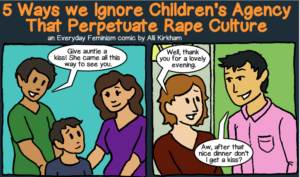
Two people in bed together. One is on their side with their eyes closed; the other person has their arms folded, staring at the person next to them with dissatisfaction.
As a writer on relationships, sex, and feminism, I often get e-mails from readers along the lines of “I’m a feminist, but my partner isn’t – can the relationship still work?” or “Is my partner sexist?” or “How can I make my partner a feminist?”
First of all, to all those people: I hear you. I’ve been in this situation myself.
My first serious partner was definitely not a feminist. If I tried to talk about sexism, he’d come back with a comment about how men have it hard, too. While this is true, these comments derail conversations about major problems by making them about other, smaller ones.
It was like being in the ER for a sixth-degree burn and hearing, “Yeah, I get that, but we need to acknowledge that I burned my hand on a stove once.”
I constantly felt invalidated.
He was also anti-choice and once said that “pro-choice girls shouldn’t have sex” (though apparently, if his own behavior was any indication, having sex with a pro-choice girl was A-okay in his book).
My next boyfriend wasn’t much better on the feminism front. When I first referred to myself as a feminist in his presence, he said he was cool with it – under the condition that white men don’t owe women or people of color special treatment for “past wrongs” because “all we have is now.”
Yeah, he was also one of those people who “didn’t see color.”
What did I put up with these people? Well, for one thing, I didn’t realize at the time how important feminism was to me.
That’s the problem with forming morals and values: It gets really hard to date people who don’t share them.
Oh, and there was one other glaring factor: the fact that I loved them. When you love someone, being with them and putting up with sexism seems worse than not being with them at all.
But the thing is, it wasn’t.
With my anti-choice boyfriend, I worried about what would happen if I got pregnant. I would feel pressure to keep the baby, and if I didn’t, he would feel as if I’d wronged him.
And with both of these people, I felt the need to censor myself. I knew that if I complained about sexism, they’d accuse me of being biased or overly sensitive, and I’d end up questioning the validity of my own experiences. So I saved those conversations for my friends.
But as feminism became more and more important to me, hiding it felt more and more like hiding myself.
I also noticed gender stereotypes creep into those relationships. Once, my ex boyfriend told me that he felt I took a more emotional approach to our relationship, while he took a more logical one. He said that “feminine energy” was based on going with the flow, while masculine energy was based on structure and planning.
Looking back, this wasn’t true at all. In fact, one big source of conflict for us was that I was always planning and organizing and he always wanted to be spontaneous.
Why am I telling you all of this?
My point is, if you’re wondering if a relationship between a feminist and a sexist can work, my short answer is “no.” Chances are, you’ll be either arguing all the time or repressing your thoughts so you don’t argue.
But I think you already knew that.
The problem is, the logical conclusion of that statement is that you should break up with your sexist partner. And when you’re in love and attached to someone, you’ll do anything to avoid a breakup, including convincing yourself that their sexism doesn’t bother you or that it can change.
Then so be it. Don’t break up with somebody because I told you to. In my experience, if you break up with someone just because someone else thinks you should, you’ll end up pining over them or back with them anyway.
But do know that if the possibility of a breakup has been on your mind, this is a valid reason. It’s hard to make a relationship work if your strongest morals conflict. If you don’t share your core values, one of you is eventually going to get fed up. It’s just a question of who will first.
But, you may be thinking, are there any exceptions? (I know you’re probably thinking that, because we all want to be the exception.)
There is one situation where a feminist might be able to date someone who’s not a feminist: when the latter person just doesn’t quite get what feminism is or why it’s necessary, but still holds feminist values.
Maybe, for example, they’d be really angry about sexism in the workplace if they realized how often women are harassed, belittled, and excluded at work. But since they haven’t experienced it themselves, they assume women who are angry about it must be overreacting.
Maybe they just need a little push to see how bad things are and why feminism is in fact a movement to make things less bad for women and gender minorities, not to make things worse for men.
But I can tell you from experience that if they’re not actively trying to learn more about the issue, these conversations are really freaking exhausting.
Plus, it’s not your place to try to change someone’s values, no matter how misguided they are. If you can discuss gender in a mutually respectful manner, great. There’s hope. But if you keep having the same conversation over and over again and nobody wants to budge, that’s just going to frustrate you both.
At the end of the day, you can’t be in a relationship with someone’s potential. If they’re not particularly interested in becoming a conscious feminist ally, you need to assess whether you want a relationship with them. As they are. Right this moment.
Think of it this way: If you end a relationship because you disagree about feminism, you’re actually doing the other person a favor. Just as you want someone who accepts your feminism, they probably want someone who accepts them as they are.
Again, if you’re already in this situation, I’m not saying you have to slam the door in your partner’s face and walk out right this minute. If leaving is unfathomable, just keep it in the back of your mind and know the option’s there.
And know that if your partner tries to gaslight you about feminism or complain when you bring up sexism, you are not the problem, no matter what they say.
If you’re single, on the other hand, you may be in a better position to take my advice. You have the chance to avoid getting into a relationship like this in the first place.
You might even want to consider instituting a feminist-only dating policy. That way, you’ll get out of relationships with anti-feminists before you get attached and breaking up becomes easier said than done.
I know it’s shitty not to be able to make things work with someone you would’ve gotten along with just fine before your feminist awakening.
But whether you’re a feminist or not, that’s part of growing up.
When you first start dating, you often just want someone who is cute and nice and likes you.
As you become more sure of who you are and what you believe, the pool of people you’re compatible with shrinks. And that’s nothing to be ashamed of.
You deserve someone who embraces every part of you, feminism and all.
[do_widget id=’text-101′]
Suzannah Weiss is a Contributing Writer for Everyday Feminism and a New York-based writer whose work has appeared in The Washington Post, Salon, Seventeen, Buzzfeed, The Huffington Post, Bustle, and more. She holds degrees in Gender and Sexuality Studies, Modern Culture and Media, and Cognitive Neuroscience from Brown University. You can follow her on Twitter @suzannahweiss.
Search our 3000+ articles!
Read our articles about:
Our online racial justice training
Used by hundreds of universities, non-profits, and businesses.
Click to learn more




















